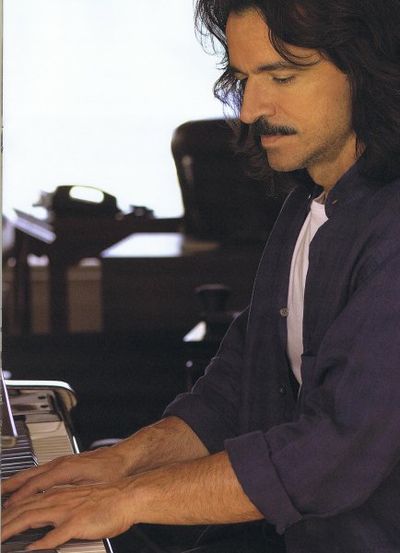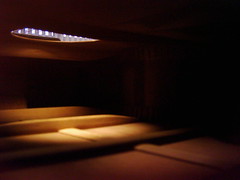Piano = Harp in a Casket
I hope this post isn't too subversive in nature. I realize that at this point I am probably in the minority as I take a stand against the effects on music by the modern piano. To be clear, I am not AGAINST the piano, I love to sit down at one and play, improvise and noodle around. I actually enjoy it but the method I use is not at all related to the program normally taught to students of the piano. I use an even easier version of my X-88 guitar paradigm.
More of a whole tone approach. 2 parrellel 6 tone whole tone scales. thought they don't exist in nature the illusions possible are pretty cool. The piano of course is designed with easy modulation and transposition in mind. With an awareness of the forced resolution of equally spaced notes I can change keys willy nilly till the cows come home, or even beyond "when the fat lady sings".

My beef with the piano is that the harp and strings have been shut up in a box so that I can't make contact with the actually music in the string. The harmonic potential and grace and nuance possible when the strings themselves can be touch and altered is a far more interesting journey to me than merely pressing a key and letting some machine within the box give me "the note". Again of the flexibility of an equally tempered piano and the illusions of music that can be created on it I have no quarrel, but there is so much more.
I recently was down at Grant MacEwan and piano venders had filled the entrance way with grand pianos for sale. I sat down at one and was pleased to play on a freshly "tuned" piano. The flexibility is unparrellelled...but the lack of purity is obvious. and for what? $40,000.00 ? ! ? I mean all one has to do is stike a "D", for instance, listen to the harmonic overtones (yes ANYONE can hear them) the pure 3rd can be heard - and then play the "F#"...YUCK. 14 cent's off the mark. Why? so that that "note" can be taken in any way the player or composer chooses. but it is not a pure 3rd, it is only an approximation. in fact ALL the "notes" in an Equal Tempered system are approximations. some (thankfully) a little closer than others (the IV and V) but others (3rds and 6ths) are seriously compromised. Such a modernly systematic assault on nature and God's infinite design.
I mean who said where those 12 perfectly evenly spaced notes are to be? In a recent email Ben suggests an imperialist origin. Just another symtom I suppose of "modern certainty", and the general tendency to accept it as the only standing reality.
At least in the case of a grand piano (like the one pictured above) one can stick their head in there and get to the damn strings. With uprights the casket is definately nailed shut....until we rescue them from their bondage! How many old pianos are sitting out there, church basements, halls, basement storage areas, all waiting to find release and given flight?
moveable bridges, pads for harmonics, electric pick ups, the possibilities, the possibilities.
More of a whole tone approach. 2 parrellel 6 tone whole tone scales. thought they don't exist in nature the illusions possible are pretty cool. The piano of course is designed with easy modulation and transposition in mind. With an awareness of the forced resolution of equally spaced notes I can change keys willy nilly till the cows come home, or even beyond "when the fat lady sings".

My beef with the piano is that the harp and strings have been shut up in a box so that I can't make contact with the actually music in the string. The harmonic potential and grace and nuance possible when the strings themselves can be touch and altered is a far more interesting journey to me than merely pressing a key and letting some machine within the box give me "the note". Again of the flexibility of an equally tempered piano and the illusions of music that can be created on it I have no quarrel, but there is so much more.
I recently was down at Grant MacEwan and piano venders had filled the entrance way with grand pianos for sale. I sat down at one and was pleased to play on a freshly "tuned" piano. The flexibility is unparrellelled...but the lack of purity is obvious. and for what? $40,000.00 ? ! ? I mean all one has to do is stike a "D", for instance, listen to the harmonic overtones (yes ANYONE can hear them) the pure 3rd can be heard - and then play the "F#"...YUCK. 14 cent's off the mark. Why? so that that "note" can be taken in any way the player or composer chooses. but it is not a pure 3rd, it is only an approximation. in fact ALL the "notes" in an Equal Tempered system are approximations. some (thankfully) a little closer than others (the IV and V) but others (3rds and 6ths) are seriously compromised. Such a modernly systematic assault on nature and God's infinite design.
I mean who said where those 12 perfectly evenly spaced notes are to be? In a recent email Ben suggests an imperialist origin. Just another symtom I suppose of "modern certainty", and the general tendency to accept it as the only standing reality.
At least in the case of a grand piano (like the one pictured above) one can stick their head in there and get to the damn strings. With uprights the casket is definately nailed shut....until we rescue them from their bondage! How many old pianos are sitting out there, church basements, halls, basement storage areas, all waiting to find release and given flight?
moveable bridges, pads for harmonics, electric pick ups, the possibilities, the possibilities.




2 Comments:
Interesting post!! Never even heard of just intonation, although I did always wonder in the back of my mind why there was 12 notes in an octave. I did some reading up on it, and I don't quite understand the whole deal about ratios. From what I gather, the equal temperament system doesn't have perfect intervals, because the errors are 'spread out.' The Just Intonation system has perfect intervals, but I guess other combinations of notes sound very bad. So, the ET system spreads out that error...? That's what I gather.
I agree about 'letting the strings out of the box!' For me, that means I'm getting into synthesizers and programming all sorts of things. Make the music from the ground up! I like the band Mute Math for that reason. Reason and Live are fascinating. I love what I can construct, all the wacky and strange things.
Very good read, my friend!
Hippies.
Hippies hippies hippies.
Doin' the hippy hippy shake, I hope!
Great post paul, and thanks for being so subversive and tearing away our well-constructed paradigms... Now all of my musical dreams are shattered. Chuck says we should all be playing sitar - carefully think about what the world will look like when that happens.
Also, you should be careful when talking about F sharps and saying YUCK in such close proximity - I thought you had taken to expletive in your normally parliamentarian posts!
Cheers, keep up the creativity!!
Post a Comment
<< Home